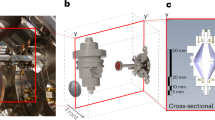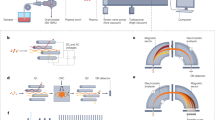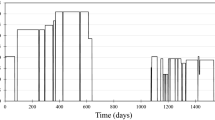Abstract
METHODS of separation of isotopes and in particular the separation of uranium isotopes, have long been studied1,2. Here I present a new variation of the “time-of-flight” process, applicable to all gaseous isotopes, although UF6 gas is considered as the example.
This is a preview of subscription content, access via your institution
Access options
Subscribe to this journal
Receive 51 print issues and online access
$199.00 per year
only $3.90 per issue
Buy this article
- Purchase on Springer Link
- Instant access to full article PDF
Prices may be subject to local taxes which are calculated during checkout
Similar content being viewed by others
References
Halle, von E., Hoglund, R. L., and Schacter, J., in Encyclopedia of Chemical Technology, 7, 91 (Interscience Publishers, 1965).
Benedict, M., Berman, A. S., Bigeleisen, J., Powell, J. E., Shacter, J., and Vanstrum, P. R., Report of Uranium Isotope Separation, Review (of) Ad Hoc Committee (Oak Ridge Report ORO-694, 1972).
Bagge, E., Concerning the Possibility of Enriching the Light Isotope of Uranium by Means of the Isotope Sluce (Deutsche Forschunbericlte, 1942).
Author information
Authors and Affiliations
Rights and permissions
About this article
Cite this article
WANG, CG. Garden hose separation of gaseous isotopes. Nature 253, 260–262 (1975). https://doi.org/10.1038/253260a0
Received:
Revised:
Issue Date:
DOI: https://doi.org/10.1038/253260a0
Comments
By submitting a comment you agree to abide by our Terms and Community Guidelines. If you find something abusive or that does not comply with our terms or guidelines please flag it as inappropriate.



